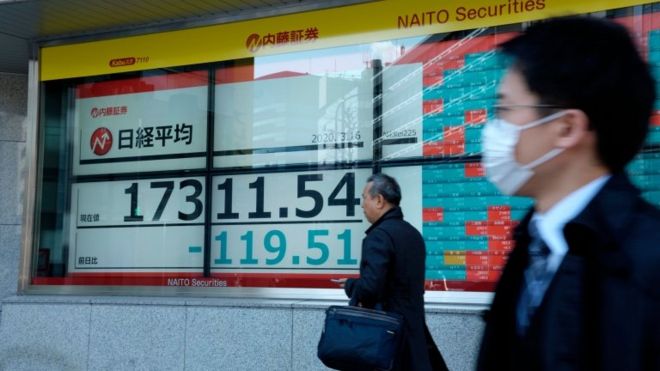Asia stocks fall because of Coronavirus after global central bank action
The US Federal Reserve cut interest rates to almost zero and launched a $700bn stimulus programme.
It was part of coordinated action announced alongside the eurozone, the UK, Japan, Canada, and Switzerland.
Investors are concerned that central banks now have few options left to combat the impact of the pandemic.
After the emergency announcements US stock futures indicated a sharply lower open for Wall Street later.
Japan’s benchmark Nikkei 225 closed 2.5% lower, Hong Kong’s Hang Seng lost almost 4%, and the Shanghai Composite in China was down by 3.3%.
Shares in Australia took a huge tumble, recording their biggest daily percentage fall on record as the benchmark ASX 200 index closed 9.7% lower.
The Reserve Bank of Australia has said it “stands ready” to pump more money into the country’s financial system.
Crude oil prices and the US dollar have also fallen on global markets.
The falls on share markets come as investors worry that the world’s biggest central banks may now have very little ammunition left to deal with the effects of the coronavirus if the global economic climate continues to worsen.
“They pulled out whatever weapons they had and my sense is I think it may help initially but I don’t think it goes much further because this is still a developing issue. They used up basically all their ammunition and we’re down to sticks and stones,” said Robert Pavlik, chief investment strategist at Slatestone Wealth.
Earlier the US Federal Reserve cut its interest rates by 100 basis points to a target range of 0% to 0.25% and said it would offer at least $700bn for support to the markets in the coming weeks.
Speaking after the announcement Fed chairman Jerome Powell said “The virus is having a profound effect.”
The Bank of Japan also eased monetary policy by pledging to buy risky assets at double the current pace and announced a new loan programme to extend one-year, zero-rate loans to financial institutions.
Alongside the Fed, five other central banks – the Bank of England, the European Central Bank, the Bank of Japan, the Bank of Canada, and the Swiss National Bank – also announced measures to make it easier to provide dollars to their financial institutions facing stress in credit markets.
The move was designed to bring down the price banks and companies pay for US dollars, which has surged in recent weeks.
New Zealand’s central bank also lowered interest rates by 75 basis points as it prepared for a “significant” hit to the economy.
The Reserve Bank of New Zealand Governor Adrian Orr said the virus was expected to have a severe impact on the economy over the coming year.
Credited: BBC News
https://www.bbc.com/news/business-51903195







